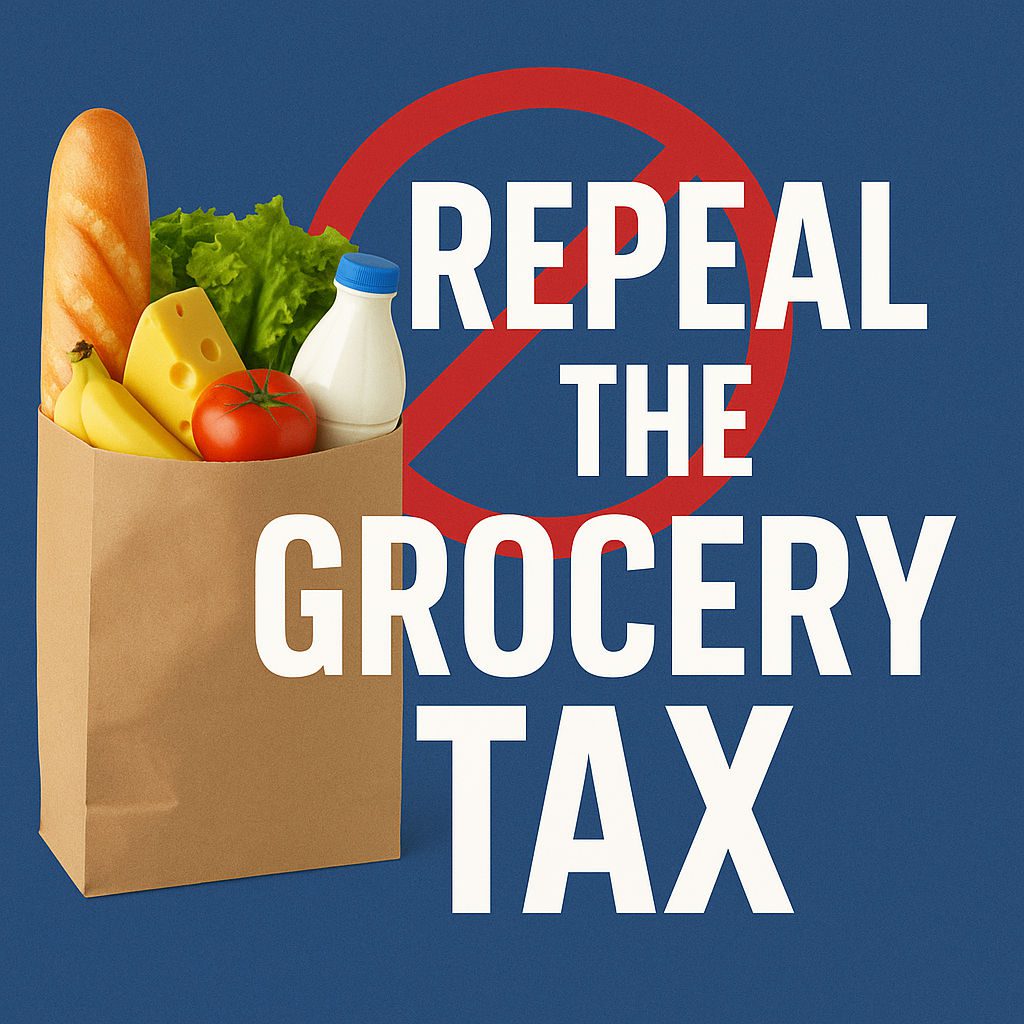For nearly two decades, Idahoans have called for one simple, sensible policy reform: repeal the grocery tax. Candidates have campaigned on it, voters have demanded it, and yet here we are—still taxing groceries in 2025. While House Bill 231 claims to offer relief by expanding the food tax credit and allowing a refund for those who keep receipts, it’s a weak substitute for real reform.
This isn’t just bad tax policy. It’s immoral.
A Tax on Necessity Is a Tax on Survival
Let’s be clear: food isn’t optional. When Idaho charges 6% sales tax on groceries, it’s taxing a necessity of life—just like taxing air or clean water. This isn’t about luxury goods or discretionary spending. It’s milk, bread, eggs, and vegetables. Taxing groceries hits every Idahoan, but it disproportionately punishes the poor, working families, seniors on fixed incomes, and anyone scraping by paycheck to paycheck.
Idahoans shouldn’t need to file paperwork to get back what never should have been taken from them in the first place.
HB231: More Bureaucracy, Not More Freedom
House Bill 231 raises the food tax credit to $155 per person and offers an option to instead receive a refund for the actual sales tax paid on eligible food—up to $250 per person. Sounds good, right?
Not so fast.
To receive the refund, you have to keep and submit every grocery receipt for the entire year. Then you must scan and upload them with your tax return. It’s a mountain of paperwork for the average person—and a logistical nightmare for seniors, people without scanners or internet access, or anyone simply trying to make ends meet.
Instead of scrapping the tax outright, HB231 adds another layer of bureaucracy. It makes low-income Idahoans jump through hoops to reclaim money that never should have been taken from them in the first place. And if you make a mistake on your receipts? You could face penalties or investigations from the state tax commission. That’s not relief—that’s punishment with extra steps.
The Tax Credit Shell Game
The defenders of this system argue that the annual grocery tax credit makes up for the damage. HB231 increases that credit—but this is still a shell game.
You still pay 6% tax every time you check out at the grocery store. That’s money out of your pocket, immediately. The refund comes months later—if you qualify and if you apply correctly. It’s not real-time relief, and it’s not a clean solution.
For example, a family of four spending $800 a month on groceries pays roughly $576 a year in grocery tax. Under HB231, they could claim a $620 refund if they filed receipts correctly. That may sound like a wash—until you factor in the time value of money, human error, and the burden of tracking every receipt for a year. For most families, it’s not worth the hassle, so the state keeps the overpayment.
It Creates Winners and Losers
HB231 also deepens inequality in how the state treats its residents:
- SNAP recipients pay no grocery tax at all.
- Middle-class families pay thousands a year, up front, and may or may not reclaim it.
- People who don’t keep receipts get the flat credit, even if their real tax burden was higher.
- People who misplace receipts get nothing.
- People who make mistakes on their refund claims risk audits and penalties.
This system picks winners and losers—often based on paperwork, not need. That’s not conservative governance. That’s bureaucracy.
A Regressive Tax in a Conservative State
Idaho is one of only a handful of red states that still fully taxes groceries. Nearly every other conservative-led state has either eliminated the grocery tax or reduced it significantly.
Why? Because taxing food violates the principle of limited government. It’s regressive, meaning it takes a larger percentage of income from the poor than from the wealthy. It’s anti-family, disproportionately burdening those with more mouths to feed. And it’s unnecessary—Idaho has record budget surpluses and plenty of revenue sources that don’t involve raiding the grocery cart.
If we believe in freedom, responsibility, and small government, we should stop taxing the food people need to survive.
The Moral Argument: Food Should Never Be Taxed
At its core, the grocery tax is immoral because it treats survival as a revenue stream.
It doesn’t just inconvenience Idahoans—it forces them to choose between food and other essentials. It’s a hidden, daily reminder that the state thinks it’s entitled to your dinner table.
Government should exist to protect rights, not nickel-and-dime people on their most basic needs. Food taxation contradicts every claim to conservative principles, limited government, or family values.
What Idaho Needs: Full Repeal, Not More Red Tape
House Bill 231 is a bandage on a broken leg. It may ease the bleeding, but it doesn’t fix the problem. It creates more paperwork, more exceptions, and more confusion.
What Idaho needs is a full repeal of the grocery tax. No more tracking receipts. No more applying for credits. Just stop taxing food—completely.
Let families keep their money at the checkout. Let small business owners simplify their accounting. Let low-income workers avoid another layer of paperwork. And let the Legislature finally deliver on a promise it’s been making for years.
Conclusion
House Bill 231 is not a solution—it’s a stalling tactic. It raises the credit slightly and dangles a new refund option in front of those who are willing to play the government’s game. But at its core, it preserves a broken system and doubles down on complexity.
Idahoans deserve better.
It’s time to stop taxing food. Period.

